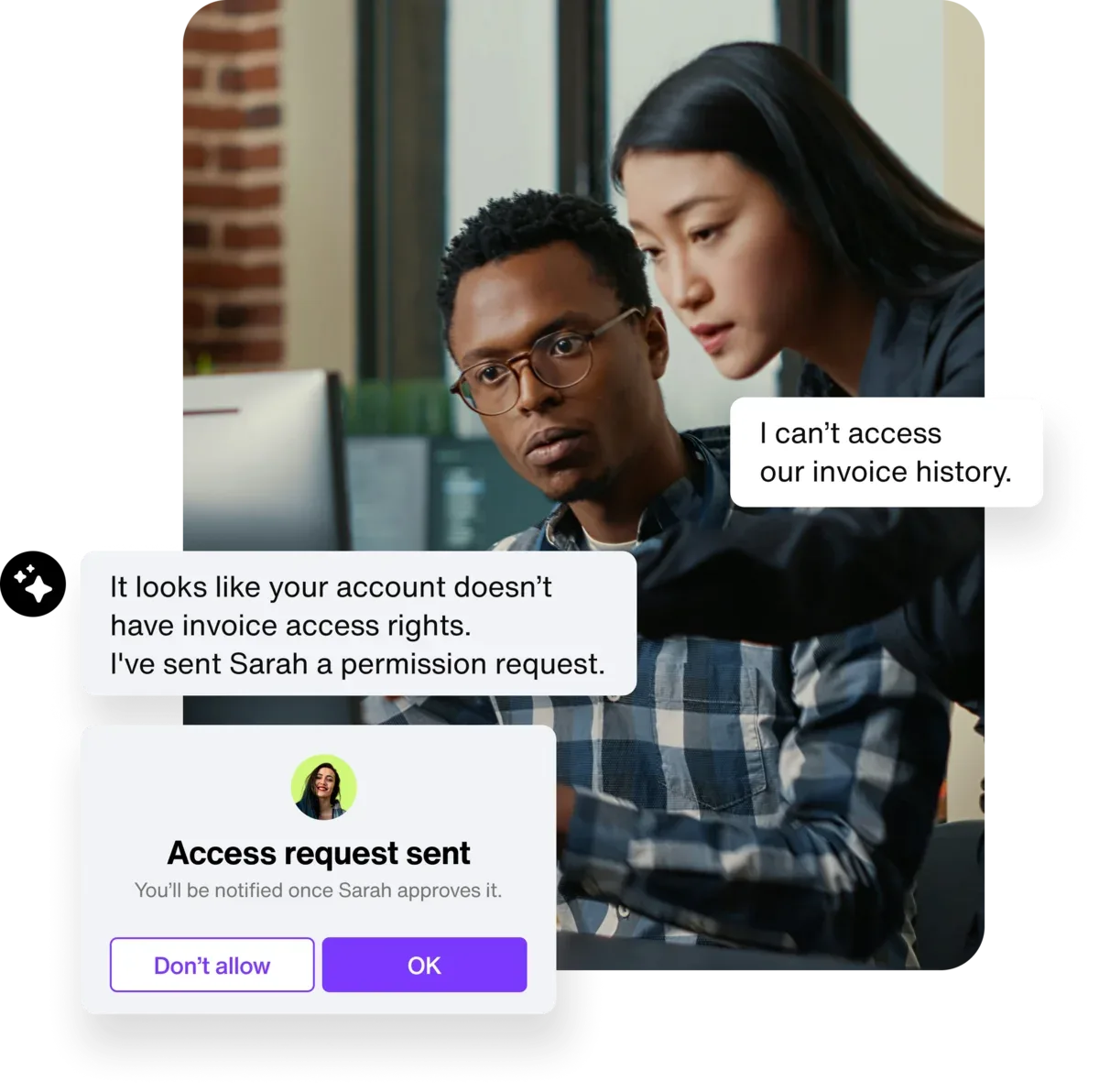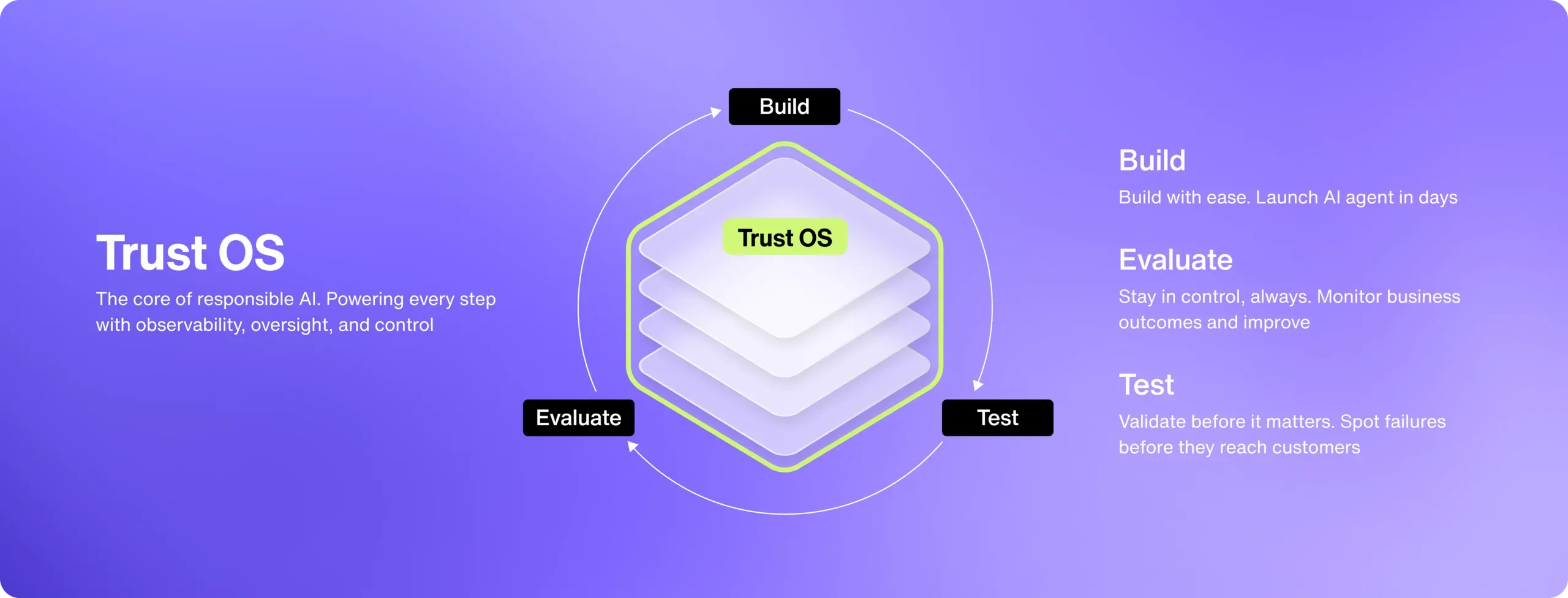AI support for B2B. Anything but basic.
Built to handle the realities of B2B support: fragmented systems, layered permissions, and retention pressure.

The AI agent that turns B2B complexity into growth
Resolve high-context SaaS issues fast and turn onboarding, retention, and troubleshooting into your growth levers.
The AI agent that turns B2B complexity into growth
Resolve high-context SaaS issues fast and turn onboarding, retention, and troubleshooting into your growth levers.
Detects drop-off, friction, or stalled onboarding before users disengage. Proactively step in with timely, contextual support to keep users engaged and protect revenue.
Deliver guided setup, product walkthroughs, and instant answers from day one. Help users activate faster while easing the load on support and success teams.
Tackle technical, account-specific issues with precision. Pull from internal systems to deliver complete answers in one go without bouncing between teams.
Build. Test. Evaluate. Repeat. AI for B2B is here
Customize your AI agent for the complexity of B2B. Test it against real support conversations, fine-tune it for your workflows, and continuously improve performance. Everything you need to launch with confidence and turn support into a growth driver.

Instant ROI on the B2B metrics that matter
From activation to churn prevention to high-context issues,
deliver human-like support without the ticket backlog.
Powering 7 billion conversations
every month. Ready for yours.
AI agent FAQs
AI agents in B2B customer service offer several advantages, including:
24/7 availability across global time zones without increasing headcount.
Scalable AI support that handles growth and spikes in demand, especially for routine issues that don’t require human intervention.
Faster response and resolution times, helping meet strict SLAs and boosting customer satisfaction (CSAT).
Proactive AI problem detection and resolution, preventing tickets from being created and issues from escalating.
Multimodal support—including AI voice, AI chat, and text—across channels like SMS, Email, WhatsApp, web, and mobile chat.
Consistent, brand-aligned communication across all customer touchpoints.
Data collection and analysis from every interaction, providing valuable insights into customer behavior and pain points to improve products and services.
Multilingual AI support capabilities that enable communication in customers’ preferred languages, breaking down barriers and improving accessibility.
Implementing AI agents in B2B customer service comes with several challenges, including:
Data integration: Connecting AI agents with existing CRM, ERP, and ticketing systems can be complex. Sendbird connects easily with many knowledge sources and customer service platforms, including Salesforce, Freshworks, Zendesk, Sendbird Desk, Confluence, Sprinklr, Notion, and more.
Industry-specific accuracy: AI agents must be trained on domain-specific and owned, historical data to provide relevant and precise responses that LLMs don’t get from their initial training dataset.
Handling complex queries: B2B inquiries often involve multiple stakeholders/systems for nuanced issues. Sendbird’s AI agents can be customized with no-code using language to create flexible AI workflows to adapt to customer needs, enabling precise, context-aware responses.
Change management: Teams need clear AI governance features and clear AI escalation protocols to effectively adopt and work alongside AI agents.
Customer trust: Agentic AI compliance and safety are critical to reduce AI risk and foster long-term customer trust.
Implementation costs: Cost is only an issue if ROI is not there. Check out our AI customer support ROI calculator to estimate your savings. The Sendbird expert team is here to help you boost CX and CSAT in the shortest amount of time.
Mitigation approach: Start with pilot programs to test and refine AI capabilities, gather feedback, and scale gradually to ensure smooth adoption and success.
Stakeholder adoption: It’s important to quickly show support teams that AI agents aren’t here to replace them but to free themselves from mundane tasks and that their AI supervision (human in the loop) is critical to ensure the AI customer support can scale effectively.
👉 More on AI customer service stakeholder adoption in this ebook.
Common use cases of AI agents in B2B customer service include:
Technical support: Handling complex troubleshooting, configuration assistance, and escalation management.
Appointment scheduling: Managing bookings, reminders, and rescheduling in a conversational manner.
Order and inventory management: Providing real-time order tracking, inventory status, and order modifications.
Customer onboarding: Guiding new clients through setup processes and sharing tailored resources.
Knowledge base navigation: Helping users find relevant documentation and self-service content quickly.
Contract management: Assisting with contract queries, renewal reminders, and document delivery.
Billing and payment support: Answering invoice questions, payment processing issues, and refund status updates.
Product recommendations: Suggesting complementary products or service upgrades based on customer profile and history.
Incident reporting and escalation: Allowing customers to report issues promptly and ensuring timely escalation to the right teams.
Feedback collection: Gathering customer feedback and satisfaction data automatically after interactions or milestones.
Compliance assistance: Helping customers understand compliance requirements and providing relevant policy information.
Multi-stakeholder coordination: Managing communications and updates among different teams within a client organization.
Here are some best practices when using AI agents in B2B customer service:
Start with clear customer service goals: Define specific business objectives for your AI agents, such as reducing response times or improving self-service rates.
Train your AI agent on relevant data: Use domain-specific, historical customer conversations to teach AI agents for accuracy and context-awareness.
Ensure seamless AI escalation: Design AI workflows to smoothly hand off complex or sensitive issues to human agents without friction.
Maintain transparency: Inform customers when they’re interacting with an AI agent and provide easy access to human support.
Ensure data security and agentic AI compliance: Protect sensitive customer data with robust security measures and comply with regulations like GDPR or HIPAA.
Continuously monitor and improve your AI agents' performance: Regularly analyze AI agent performance and customer feedback to refine responses and AI workflows.
Empower your team: Provide training and AI tools so customer service reps can effectively collaborate with AI agents.
Leverage multilingual AI support: Use AI’s language capabilities to serve global clients in their preferred language.
Integrate across communication channels: Ensure AI agents deliver consistent, unified support across different technologies, such as voice and text, and channels like email, chat, SMS, and other customer service platforms.
Pilot and scale gradually: Start with small-scale deployments to test effectiveness and adjust before wider rollout.